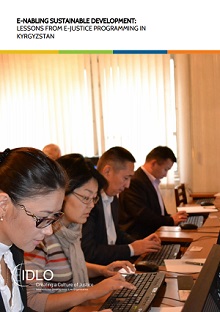IDLO has actively supported a wide range of e-justice initiatives in the Kyrgyz Republic to improve the efficiency, transparency and accountability of the judiciary through digital technologies.
IDLO was able to help build the institutional foundations that increased Kyrgyzstan’s readiness to embrace e-justice solutions. The government’s National Target Program for Development of the Judiciary, which IDLO helped develop, has paved the way for systematic financing of digitalization efforts within the judiciary. Today, the Kyrgyz Government has taken ownership of these reforms. It is allocating the lion’s share of financing needed to continue these efforts and, for several years, has steadily increased funding for the judiciary and digital technologies.
“IDLO's partners in the Kyrgyz Republic share the desire to strengthen the capacity of the judiciary in digitizing its business processes and services,” explained Nurlan Duisheev, IDLO’s Judicial Reform Adviser in Kyrgyzstan.
| An interactive map that is available to the public at map.sot.kg/en shows, district by district, the number of judicial decisions published since 2015. In 2019 alone, 64,702 decisions – around 90% of the total – were published by the Kyrgyz courts. |
“The development and implementation of e-systems has a multiplier effect as they enhance the capacity of the judicial system and provide benefits to people who use the judiciary services online. The introduction of e-justice tools reduces time and costs in sharing court materials and information with citizens, government agencies and the judicial system,” he added.
The judiciary with support from IDLO and USAID in 2015 created ‘Adilet Sot’, an ICT unit dedicated to the maintenance and expansion of e-justice tools, that is now independently financed by the court system. Adilet Sot has proven crucial to the long-term sustainability of e-justice programs in Kyrgyzstan.
Publication of judicial decisions
 |
| Judge Jamila Sabitova at the Bishkek City Court (credit: Olivier Le Blanc, USAID in the Kyrgyz Republic) |
All courts are now equipped with computers and have internet access. They publish judicial decisions online: by the end of 2019, almost 90% of all judicial acts were being published on the website act.sot.kg, using a de-personification system that anonymizes sensitive personal data. This not only makes judicial decision-making more transparent and easily accessible, but also allows legal professionals, academics, journalists and participants in court proceedings to analyze judicial practice, produce data-driven materials and develop a common understanding of how legal proceedings are handled.
“The website is a useful tool for increasing transparency because everyone can see your publication. Besides, it is convenient for court users as all court hearings are listed there, and there is no need to visit the court for information. This is especially crucial for people from remote regions. Moreover, it is very efficient for the chairperson of the court as he or she can see the number of cases assigned to a particular judge,” noted Jamila Sabitova, a judge of the Bishkek City Court.
2019 also saw the launch of new audio-video transcription equipment in 77 courtrooms, which provides a strong foundation to improve speed, convenience and availability of information for participants in judicial proceedings. Verbatim transcription can help reduce false testimony and improper behavior in court. In addition, the technology allows for remote testimony and interrogation of witnesses, thereby reducing costs associated with escorting accused criminals to and from courthouses.
Automated case distribution
 |
|
Read IDLO’s Brief for lessons learned about e-justice programming in Kyrgyzstan |
Another component of the new arsenal of digital answers that are helping to reduce corruption during case handling in Kyrgyzstan is automated case distribution. A recently introduced system is now fully operational in the Supreme Court, while another is about to be rolled out within all lower instance courts. In addition to making processes faster and more efficient, a key benefit of automation is greater transparency as the software provides a history of case allocation, online calendars for judges, and instant access to reports and statistics.
“Judges get cases directly at the push of a button, which saves time and effort for judges and court personnel. It also avoids subjectivity because disputes are assigned automatically, based on a logical algorithm. The process has become more transparent and fairer than ever for court users,” commented Konstantin Stepanov, a specialist of Adilet Sot.
He continued: “Initially, the system was designed to create a simple case distribution mechanism among judges in the three divisions within our courts [civil, administrative and criminal]. In time, the software evolved to solve more sophisticated tasks and has now turned into an integrated all-in-one solution that covers wider areas of internal document flows within the Supreme Court. The plan is to have this system operational as soon as possible in all courts of the Kyrgyz Republic.”
“Digitalization is the principal tool in reducing the human factor and combating corruption.” – Sooronbai Zheenbekov, President of the Kyrgyz Republic

